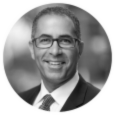Executive Committee
Officers
Robert Negrin, MD ('26)
Cynthia E. Dunbar, MD ('26)
Alison Loren, MD, MSCE ('26)
Jennifer R. Brown, MD, PhD ('28)
Joseph R. Mikhael, MD ('26)
Councillors








Ad Hoc, Non-Voting Members
Georg Aue
, MD, PhD, MBA
('27)
Hetty
Eileen Carraway
, MD, MBA
('26)
Amy
E. DeZern
, MD
('26)
Phoebe Joy Ho
, MBBS
('27)
James LaBelle
, MD, PhD
('27)
Michael
L. Linenberger
, MD
('26)
Ivan Maillard
, MD, PhD
('27)
Menaka Pai
, MD, BSc, FRCPC, MSc
('27)
Mary-Elizabeth
M. Percival
, MD
('27)
Andrew
W. Roberts
, MBBS, PhD
('29)
Bart Scott
, MD
('26)
Shalini Shenoy
, MD
('26)
Surbhi Sidana
, MD
('26)
Alison
R. Walker
, MD, MBA, MPH
('26)
Alisa
S. Wolberg
, PhD
('26)
Committee Mandate
Function
The Executive Committee is the governing body of ASH.
Meetings
While the ASH Bylaws require the voting members of the Executive Committee to hold at least two regular meetings a year, the Executive Committee usually meets four times a year; this includes (1) a one-day, in-person meeting in February following the joint Program Committee meeting, (2) an in-person, multi-day retreat in May, (3) an in-person meeting in September following the second meeting of the joint Program Committee, and (4) a virtual meeting in November. The Executive Committee may convene at other times and the President, in coordination with the Executive Office staff, determines when these meetings are necessary.
Membership
The Executive Committee consists of the President (who serves as its chair), the President-Elect, the Vice President, the Secretary, the Treasurer, and the eight Councillors. The Editor-in-Chief of Blood with the standing committee chairs serve as ad hoc, non-voting members of the Executive Committee and attend the in-person Executive Committee Spring Retreat in May as well as the virtual Executive Committee meeting in November. The editor-in-chief and standing committee chairs participate in open discussions but are excluded from Executive Sessions held during both meetings. Councillors can serve simultaneously as associate editors for any of the Blood journals but must recuse themselves from Executive Committee votes on issues related to the Blood journals.
The Executive Committee may determine by a majority vote that an interim vacancy has occurred when a member of the Executive Committee fails to attend three consecutive meetings.
Terms of Office
The President, President-Elect, and Vice President serve a one-year term in each office unless there is an unexpired term of the President. Succession of the Vice President to President-Elect, and in turn to President, is automatic. The Secretary and Treasurer each serve one four-year term; the terms of the Secretary and Treasurer are arranged so that they will not expire in the same year. The Councillors serve four-year terms, arranged so that two will expire each year.
Responsibilities
Each Executive Committee member should expect to be assigned responsibility for some aspect of ASH business; it might involve serving on a special committee or a subcommittee of the Executive Committee, such as the Compensation Subcommittee or Finance Subcommittee. In the final year of their terms, the two most senior Councillors serve as members of the Finance Subcommittee.
OFFICERS
The President, President-Elect, Vice President, Treasurer, and Secretary are the ASH Officers.
President
The President is chair of the Executive Committee and performs all duties typical of the office.
President-Elect
The President-Elect serves as a member of the Finance Subcommittee. The President-Elect recommends chairs and members of committees for the coming term year with the advice of the Nominating Committee and the approval of the Executive Committee. The President-Elect selects the Presidential Symposium and Ham-Wasserman Lecture speakers for the ASH annual meeting to occur during their presidential year.
Vice President
The Vice President serves as a member of the Finance Subcommittee and selects the Education and Scientific Program Co-Chairs for the ASH annual meeting to occur during their presidential year.
Secretary
The Secretary prepares minutes of any Executive Sessions of the Executive Committee when the staff board liaison is not present. The Secretary serves as a liaison member of the Program Committee and is responsible for oversight of the annual abstract process; this involves organizing reviewers and coordinating reviewers and interacting with staff and the abstract management vendor to ensure review of numerous abstracts. During the September joint Program Committee meeting, the Secretary leads the discussion concerning final assignment of oral and plenary presentations at the ASH annual meeting.
Treasurer
The Treasurer oversees all financial concerns of ASH as well as the development and presentation of the budgets of the Society. The Treasurer submits an annual report of the monies received and expended and prepares a detailed statement of the financial condition of ASH, which is made available to all members. The Treasurer monitors reports prepared by the Finance department staff throughout the year and chairs the Finance Subcommittee.




